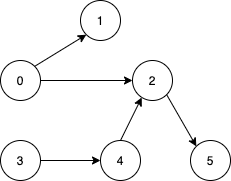⭐️⭐️
# 題目敘述
Given a directed acyclic graph, with n vertices numbered from 0 to n - 1 , and an array edges where edges[i] = [fromi, toi] represents a directed edge from node fromi to node toi .
Find the smallest set of vertices from which all nodes in the graph are reachable. It’s guaranteed that a unique solution exists.
Notice that you can return the vertices in any order.
# Example 1

Input: n = 6, edges = [[0,1],[0,2],[2,5],[3,4],[4,2]]
Output: [0,3]
Explanation: It’s not possible to reach all the nodes from a single vertex. From 0 we can reach [0,1,2,5]. From 3 we can reach [3,4,2,5]. So we output [0,3].
# Example 2

Input: n = 5, edges = [[0,1],[2,1],[3,1],[1,4],[2,4]]
Output: [0,2,3]
Explanation: Notice that vertices 0, 3 and 2 are not reachable from any other node, so we must include them. Also any of these vertices can reach nodes 1 and 4.
# Solution
class Solution { | |
public: | |
vector<int> findSmallestSetOfVertices(int n, vector<vector<int>>& edges) { | |
unordered_set<int> s; | |
for (vector<int>& edge : edges) { | |
s.insert(edge[1]); | |
} | |
vector<int> res; | |
for (int i=0; i<n; i++) { | |
if (s.find(i) == s.end()) { | |
res.push_back(i); | |
} | |
} | |
return res; | |
} | |
}; |
class Solution { | |
public List<Integer> findSmallestSetOfVertices(int n, List<List<Integer>> edges) { | |
Set<Integer> link = new HashSet<>(); | |
for (List<Integer> edge : edges) { | |
link.add(edge.get(1)); | |
} | |
List<Integer> ans = new ArrayList<>(); | |
for (int i = 0; i < n; i++) { | |
if (!link.contains(i)) { | |
ans.add(i); | |
} | |
} | |
return ans; | |
} | |
} |